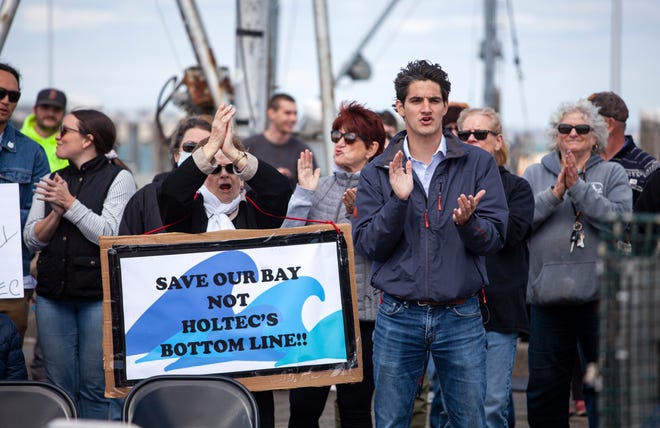'Not one drop': Hundreds rally in Plymouth to prevent dumping radioactive water into ocean
PLYMOUTH – About 250 residents gathered at the Town Wharf in Plymouth Saturday to protest possible nuclear waste dumping by Holtec International into Cape Cod Bay off the Plymouth coast.
"Not one drop!" the crowd chanted in opposition to a proposal to dump a million gallons of contaminated water from Plymouth’s decommissioned Pilgrim Nuclear Power Station.
“We are America’s hometown, not Holtec’s dumping ground,” said Betty Cavacco, a member of the Plymouth Select Board.

Paul Quintal, the organizer of the rally, said he was frustrated with the company for even considering dumping the radioactive water into the bay.
"Will you bring your grandkids to swim nearby? Are you going to eat a shellfish, or lobster out of Cape Cod Bay when there is a hint of radioactive matter in the water?" he asked. "It will be devastating."
Ally Hatch, 16, of Plymouth, came to show support at the rally.
"Don't let them dump it into the water," she said.
Twelve speakers from government, environmental protection groups, fishery industry, and other businesses shared their concerns about the negative impact from the dumping.
Beth Casoni, executive director of the Massachusetts Lobstermen's Association, said the radioactive chemicals will pose a significant threat to the right whales and drive customers away from seafood caught in the bay.
In Duxbury, Kingston and Plymouth Bays, there are 50 oyster farms – the largest concentration in the state, worth $5.1 million last year, according to the Massachusetts Seafood Collaborative. The collaborative said dumping the water would devastate the industry and the local economy.
Casoni suggested the crowd send email or call their local authorities to take action.
"How is it reasonable or possible?" she said.
"Everybody should be horrified about it," Christine Silva, a real estate agent in Plymouth said. "I already have people saying to me 'I don't want to live around Plymouth if that happens.' "

Risky options
Pilgrim Nuclear Power Station in Plymouth was built in 1972.
After its decommission in 2019, Holtec International bought the station to redevelop the 1,700-acre site for commercial or industrial use.
The company must to dispose of the water used to cool radioactive rods and other components in the spent fuel pool as well as in other parts of the facility.
Holtec came up with three possible solutions: dump it in the bay, evaporate it, or transport it to the company’s storage facility in Texas, where other waste from the plant has already been sent. Each option comes with its own risks and costs.

In Dec. 2021, a statement from Patrick O'Brien, a senior manager for government affairs and communications for Holtec Decommissioning International, stated "the processed water will remain on site, safely stored, and that we will not discharge any processed water in 2022 while this evaluation (of alternative disposal options) is undertaken."
Holtec and Nuclear Regulatory Commission officials said in interviews that radioactivity and other contaminants including metals in the coolant water would be reduced through a filtering process to levels allowed under federal permits before being released, and environmental impacts and levels in the ocean would be monitored. The plant has released treated radioactive water during the course of its operations, most recently in 2017, O'Brien said.

The Plymouth Board of Health passed a resolution on March 9, 2022, expressing its opposition to dumping the into Cape Cod Bay and asking Holtec to choose one of the other available disposal options.
The resolution cited several radioactive chemicals of concern, including cesium-137, strontium-90, cobalt, tritium and plutonium.
“All of these radioactive compounds have already been found in the surface water, groundwater, and soils at Pilgrim at levels exceeding ‘background levels,’" the resolution reads. “There is also a longer-term risk to our sole-source aquifer water supply – especially from tritium which isn’t removed by existing filtration procedures used in purification attempts.”
More:Bills to ban water discharge at Pilgrim Station advance, BOH passes resolution in support
O’Brien said the treatment process uses multiple technical filtration and treatment systems, and any such water must be tested before anything else can be done with it.
“This is sampled before any potential release would occur, as has been done for the previous 50 years,” O’Brien said.

Diane Turco, the director of Cape Downwinders, who has been following closely regarding the environmental impact of the power station since the 1980s, said substances like tritium cannot be filtered out from the water.
Turco and Quintal believe shipping the water to a licensed processing facility is the best solution.
Holtec maintains they have not ruled out any of the available options, although they said the fuel required to evaporate the water, which was previously done using residual heat from the reactor, or trucking to sites as far away as Texas would both use fossil fuels and cost more. They also cited the safety concerns of transporting toxic materials, even though they have already done so with other waste materials from the plant.
More:Rally to stop Pilgrim plant wastewater discharge draws together businesses, activists
Call for transparency
Quintal said he asked a representative from Holtec about whether the water contains radioactive chemicals during one of the recent public hearings.
"The answers were horrible. All they did was dance around the questions, saying 'we have our laboratory studying on it right now,'" he said.
He said Holtec's response was concerning.
"They won't tell us," Turco said. "That's the problem. The state doesn't know. No one knows."

A rally for new legislation
Quintal said he hopes the rally can bring more support to the two separate emergency bills preventing the discharge of the radioactive water. Both bills will be the subject of public hearings in the next few weeks.
State Rep. Kathleen LaNatra, D-Plymouth, presented a similar bill in the House that prevents the discharge of radioactive materials and imposing a fine beginning at $5,500, and not to exceed $15,000 for each subsequent infraction.
LaNatra's bill is scheduled for a hearing Friday, April 15.

State Sen. Susan Moran, D-Plymouth/Barnstable, sponsored the legislative bill in the Senate, preventing the discharge of contaminated materials and imposing a fine of no more than $10,000 for the first offense, and not to exceed $25,000 for each subsequent infraction.
The bill is scheduled for a hearing in Judiciary Committee on Tuesday.
She urges the public sign up to testify in person or submit written testimony by 5 p.m. on Monday.
"I think the joint effort between the House and the Senate sends a strong message," Moran said. "That is why I'm optimistic about it."
Material from The Associated Press and WCVB, media partner of The Patriot Ledger, was used in this report.

Thanks to our subscribers, who help make this coverage possible. If you are not a subscriber, please consider supporting quality local journalism with a Patriot Ledger subscription.
Reach Hongyu Liu at HLiu@patriotledger.com.

No comments:
Post a Comment
Note: Only a member of this blog may post a comment.